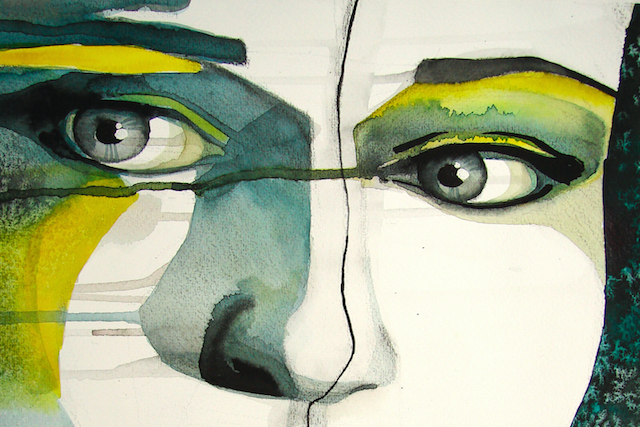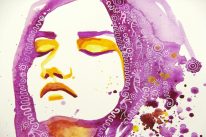
“When I loved myself enough, I began leaving whatever wasn’t healthy. This meant people, jobs, my own beliefs and habits—anything that kept me small. My judgment called it disloyal. Now I see it as self-loving.” ~Kim McMillen
I like to think of my inner self as a curly-haired stick figure who lives inside my chest cavity. Like most inner selves, mine has a simple, childlike quality. She smiles when she’s happy and cries when she’s sad. She has an intuitive sense of what is right and wrong. She speaks her needs simply, the way a young girl might.
My inner self and I are on good terms nowadays, but it hasn’t always been this way. When I was addicted to booze, food, and relationships, I treated my inner self like a prisoner.
For years, I dazed her with whiskey and wine and snuck away to make rash decisions under the light of the moon. Through a groggy haze she would slur warnings: “Don’t drive! Don’t sleep with him! It’s dangerous!” But I had abandoned her, lost in the sweet abyss of another blackout, and left her alone to handle the consequences that met the body I’d left behind.
As I got older, I sought love in the way the women of my family had for generations: by getting thin. I fed my inner self rations and scraps, barely enough to get by. Her hungry cries were met with six almonds, a tall glass of water, one slice of bread.
As my eating disorder progressed, I purged after most meals, eyes watery and kneecaps bruising against the linoleum floor. I monitored my inner self with scornful eyes. She shrunk under my gaze.
As you might imagine, playing captor to my inner self got very tiring. I felt a wave of relief when I became romantically involved with a partner and could focus my attention on him instead.
Finally, a respite! I was no longer trapped alone with my inner self and her incessant whining, her needs, her uncontrollable feelings! By contrast, he seemed uncomplicated. Unbroken. Better than I could ever be.
Over the next two years, my visits to my inner self became more and more infrequent. She gathered dust like a china doll.
Sometimes—after particularly debilitating hangovers, tortured binges, or grueling arguments with my partner—I would recognize, with a sharp burst of clarity, the unmanageability of my predicament.
Remorsefully, I would vow to do better. I would rush back to my inner self and pant, out of breath, “This is the last time. I won’t treat you so badly again.” But those promises quickly collapsed under the weight of my shame.
To alleviate my self-loathing, I cracked the whip above my inner self, desperate to improve. “Work harder!” I shouted. ”Do more!” “Be better!” “Fix yourself!”
Around the addiction carousel I went, stumbling from drinking to eating disorder to codependency to perfectionism. My inner self bore the brunt of my cruelty. Eventually, she stopped trusting me entirely.
Years of therapy and self-reflection later, I reached an impasse.
By most definitions of the word, I was utterly free; I made my own work schedule, enjoyed financial security, and could travel any time, anywhere. In the presence of friends, I radiated enthusiasm and laughed straight from my belly. But in my own company, when the afternoon sunlight cast shadows across my carpet and the muted sounds of the city came through my open window, I felt utterly alone.
I couldn’t deny the truth: I was trapped in a life dictated by vicious, anxious cycles. The life I wanted—the liberated, peaceful, inspired life—would be unattainable until I confronted my addictions. Not just one of them, but all of them. I had to tug the weed from the soil at the very root.
And so I took a deep breath and stepped off of the addiction carousel. Squinting and dizzied beneath the carnival lights, I took a hard and honest look at my inner self—the first I’d taken in years.
She had become unrecognizable. Emaciated, exhausted, fearful. Anxiety ran through her veins, rich and red as blood. She was afraid of me. And her voice—the voice that had called out:
“I’m overwhelmed. Can we slow down for a second?”
“I’m tired. Can we go home and sleep?”
“I’m so fucking sad today.”
“Don’t sleep with him! You don’t even know him!”
“I’m doing the best that I can.”
“Can you hear me?”
That voice had disappeared entirely. Like newborn babies whose cries go unanswered, my inner self’s voice had died. My heart broke as I reflected on the years of neglect I’d shown her.
I realized then that my newfound sobriety was much more than a refusal to pick up the bottle. It was an uncompromising commitment to rebuild trust with my inner self. After years of neglect, I had to show her, with my words and actions, that I would care for her
Since then, I’ve come to learn that each of us enters recovery with a traumatized inner self. Every time we acted addictively by taking that drink, or eating all three pints, or spending our savings, or losing ourselves entirely in our lovers, we neglected that quiet voice that was always there, that knew we were harming ourselves, that begged to be treated with love.
I have been untangling my myriad addictions for almost three years, and this conception of my inner self has been my greatest tool in my recovery. Every time my inner self speaks up, I am presented with a choice. I can listen and act accordingly. Or I can disregard her wishes and begin another cycle of neglect.
In recovery, my work is to rebuild trust with my inner self by feeling and speaking her truth by:
- Naming and feeling my feelings instead of numbing them
- Prioritizing my reality over others’ perceptions
- Setting boundaries with others
Naming and Feeling My Feelings
During my addictions, I became an expert at self-medicating my anxiety, shame, fear, and sadness. A hearty glass of cabernet, I believed, was the respite I deserved after a long, weary day of trying not to feel my feelings.
When I woke up the next morning with a headache and drinker’s remorse, anxiety was the only emotion accessible to me. Grief, loss, anger, and sadness were buried under layers of shame that hardened over time. I effectively exiled my full spectrum of human emotion.
Recovery, especially early recovery, has been a process of reclaiming the sensitivities that make me human. Without the vices that numbed my heart like Novocain, my feelings arise swiftly, uncensored and colorful. Not just the painful ones, but the happy and beautiful ones, too. I cry most days with equal parts sadness and joy.
At times, I feel like there must be something wrong with me, as if someone cranked the volume dial on my emotions to the max and left it there.
My work in recovery is learning to sit with, and work with, those feelings. What makes this challenging work possible—enjoyable, even—is the relief my inner self feels when, for the first time in ages, her simple truth travels from her heart to my lips without interruption. With every potent emotion comes an opportunity to make her feel seen and heard.
Prioritizing My Reality Over Others’ Perceptions
When I was in the throes of my addictions, I became an expert at keeping up appearances. Nightly, my inner monologue went something like this:
Can I get away with sneaking another drink? I wonder if Joe saw me pour the last two… Probably better to put this one in my water bottle…
I wonder if this bathroom has a fan to hide the sounds of my purging… I better turn the water on. And fake a sneeze or two to explain my watery eyes…
Did they notice that I blacked out at the party last night? God, I hope not… How can I find out what I said without seeming suspicious?
Managing appearances became my part-time job. I cared more about others’ perceptions of my reality than my own reality. White lies and half-truths flooded my conversations, even when I had nobody to impress and nothing to prove. Every time I distorted my story, I became more distant from my inner self.
In recovery, I uncompromisingly follow my inner self’s judgment. I am accountable to her first and foremost. My friends’, family, and colleagues’ opinions of me are secondary because, at 1AM when I’m sleeplessly staring at the ceiling, my inner self is the one I’m stuck with.
In recovery, when I’m swept away by the cacophony of others’ needs and wishes –
“Will you sign up for this?”
“Want to go back to my place?”
“Can you help?”
“Call me back”
“I need—”
“Will you—”
“I want—”
I get quiet. I listen. And I whisper, “What do you really need right now?”
And this time, I really listen.
Setting Boundaries With Others
As a recovering people-pleaser, I hate disappointing others. I spent most of my life avoiding it as much as possible. As a result, my calendar was packed with tedious obligations and my relationships were all give and no take. I left social interactions to massage the corners of my mouth, which ached from forcing a smile. I hooked up with people I didn’t even like. Basically, I felt like a shadow of myself.
In recovery, the reason why I say no to that beer is the same reason I don’t go to the party, or don’t sleep with that stranger, or don’t call during my lunch break. The same reason I say “No thanks, I don’t drink” is the same reason why I say “I felt hurt when you said that” or “No, I won’t.”
Boundaries are honesty in action. Every time I set one, I teach my inner self that she can trust me.
When I get nervous to set a particular boundary, I remember that my inner self is gaining strength under my protection and care. In this delicate stage of early recovery, she is fragile, like a seedling. She requires a safe, secure, reliable environment in which to grow. If I’m committed to bringing her to life, it’s my responsibility to shape that environment—even if that means erecting a fence to keep the pests out.
—
My addiction was characterized by living out of alignment with my inner self. My recovery, by extension, must be characterized by the opposite. For me, recovery and speaking my truth are inseparable.
I’ve heard folks describe addiction as one’s isolation from others. I think that first and foremost, addiction is one’s isolation from one’s self.
The more we treat our inner selves with compassion, the less important it becomes to please others and manage appearances. Our emotions thicken, arise, and depart. When we break the cycle of abusing our inner selves, our own company becomes bearable. And when our own company becomes bearable, sobriety becomes possible.
About Hailey Magee
Hailey Magee is a Codependency Recovery Coach who helps individuals conquer people-pleasing, set empowered boundaries, and master the art of speaking their truth. She has worked with over 100 clients from the US, Canada, Ireland, France, South Africa, and more. Sign up for a complimentary consultation to learn how coaching can help you live from a place of authenticity and inner freedom. You can follow Hailey on Facebook and Instagram, or visit www.haileymagee.com.
- Web |
- More Posts













 Though I run this site, it is not mine. It's ours. It's not about me. It's about us. Your stories and your wisdom are just as meaningful as mine.
Though I run this site, it is not mine. It's ours. It's not about me. It's about us. Your stories and your wisdom are just as meaningful as mine.
Dearest Hailey,
Thanks so much for today’s essay on our inner selves and sharing from your heart ❤️
It was exactly what I needed to hear today. I am truly inspired and wish you continued good communication with your Self on your journey. Thank you.
Terry
Thank you, @theresabajo:disqus! I’m touched by your kindness, and wish you the best on YOUR journey, as well. Take good care!
One of the best articles I’ve read in a long time! I relate to almost every word! Thank you Hailey for writing this piece x
Thank you so much for your kindness, @bridgetjane:disqus. I’m grateful it resonated with you – we’re on this journey together! Best of luck on your path in the months to come.
Thanks for sharing your story, Hailey. I’m impressed by your courage, insight and clarity!
Thanks so much, Jef! I appreciate your kindness 🙂
Thank you Hailey, I wish you the best in your life.
Thank you so much, @ayhanaalarov:disqus. Back at you!
@asphaltcowboy84:disqus, thank you for your kind words. I’m happy and grateful to hear that the piece resonated with you, and wishing you all of the best on this road to recovery! <3
Hailey – I’m sitting here in my office, pinned to my chair while reading your post. Tears are streaming down my face, my mouth agape in shock. I felt like you were actually retelling MY story! Your courageousness to speak this truth has me awestruck. It has hit me straight to the heart like nothing else ever has. The more I read, the more I saw of myself. I found myself having to go back and re-read, because my mind was ping-ponging back and forth between what you were describing and what I actually lived. The details you use to describe certain experiences, and your mindset within them, are things I wouldn’t even allow myself to articulate because I knew no one would understand; that combined with the fact that they were/are embarrassing and filled me with shame. You had the guts to put them out there like a live-preserver for others to grab onto; those of us who need to know that SOMEONE UNDERSTANDS. I’m completely overwhelmed with your truth and do not even know how to find mine. I have been in AA for almost 10 years. And while sobriety has been liberating and wonderful, I am still on the carousel…. stuck in other things that you described. I haven’t heard or seen my inner self in so many years – I don’t think I would know her, and I don’t know where to even look (wouldn’t even know how to give myself PERMISSION to look). I am so very tired. At 51, this 35 carnival ride from one thing to another has exhausted my ability to find any sustainable personal joy. Thank you for sharing this personal journey. Thank you for throwing me a lifeline. Your post was a beacon of hope. I have a lot of work to do.
@eringautier:disqus, I’m deeply moved by your words and so grateful to you for sharing them. I understand how isolating this journey can be, and I find such solace in knowing that other women have walked this path! I deeply trust that you can find that sustainable personal joy — like so many things in life, I believe it is a practice. One day at a time, as they say. Sending warmth and goodness to you! <3
Really well said Hailey. You voice a universal truth for many of us. Keep up the good work.
Thank you so much for your words, @chrisvoisard:disqus!
Love this! Completely relate to this post. Great work!
Banu, I’m so happy it resonates with you. Thank you for your kindness!